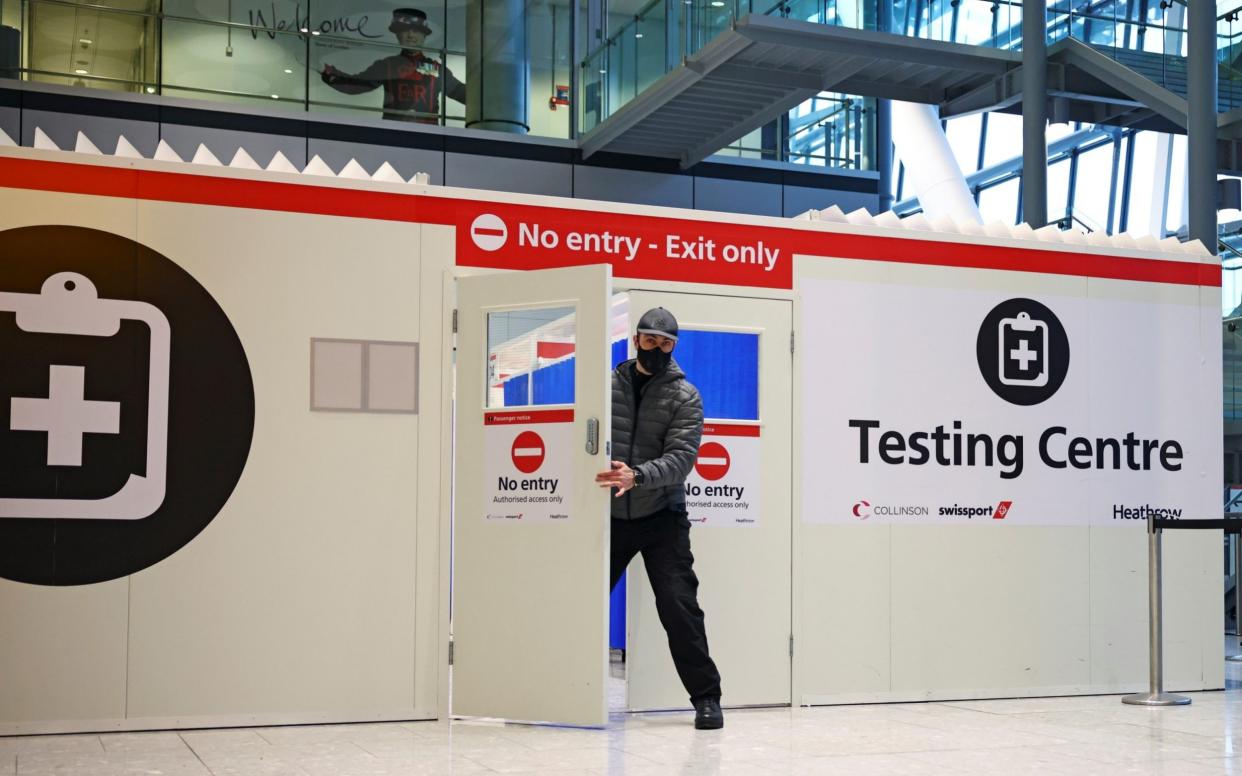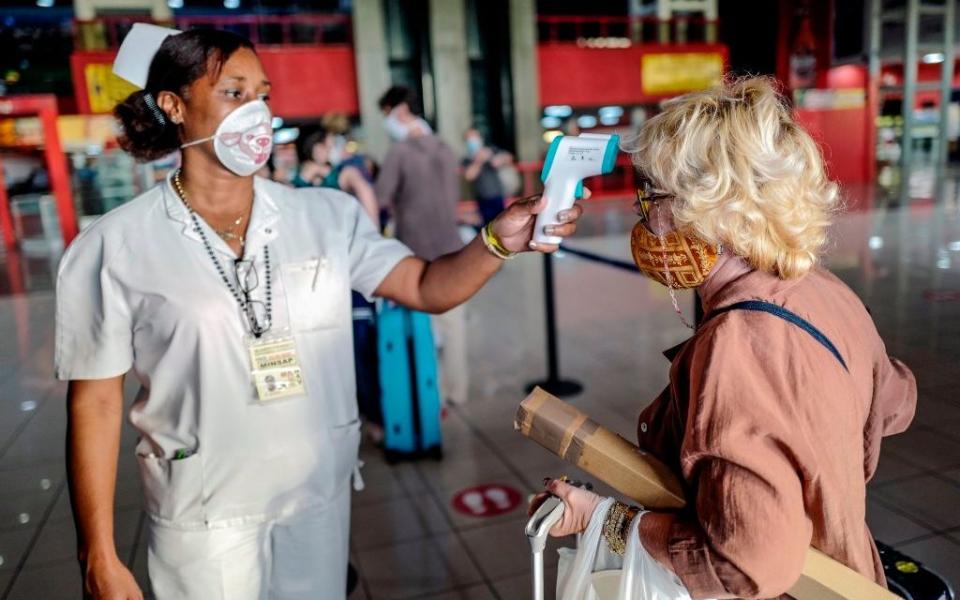UK travel restrictions: What new rules are being considered, and have quarantine hotels worked elsewhere?

Ten months on from Britain’s first lockdown, we are not closer, it seems, to freedom. Despite the ongoing rollout of a vaccine, the UK is now staring down the barrel of a near-total border closure, as the Government prepares to bring in tough new travel restrictions to protect the nation against “unidentified new variants” of Covid-19.
Talks are ongoing, but it is looking increasingly likely that all overseas visitors, including returning Britons, will be subject to a ten-day stint in hotel quarantine; a policy with no clear end date that would render holidays off the cards for the foreseeable future.
There are other options on the table, among them quarantine only for arrivals from high-risk countries, and the stricter tracking of those permitted to self-isolate at their chosen address. Here we take a look at the possibilities, their implications, and which other nations have adopted them, successfully or otherwise.
Total border closure
Back in March 2020, Boris Johnson was late to restrict travel and impose a national lockdown in comparison to other countries in Europe. Indeed, the UK border was never fully closed. This year, the Government is considering a very different approach in shutting the gates almost entirely to prevent new, potentially more dangerous variants of the virus from sneaking in.
Closing the border would require a global repatriation process for Britons stranded abroad, similar to the £75 million operation mounted by the Foreign Office in the first lockdown to rescue some 300,000 people.
Border closures were adopted by Australia and New Zealand at the start of the outbreak last year. Both countries’ borders have been largely closed to overseas visitors since March 2020 to stem the spread of Covid-19, with a limited number of residents and their families allowed to return each week. Tens of thousands of their citizens remain stranded overseas as a result; faced with paying more than £1,600 to enter hotel quarantine should they wish to return.
This appears to be a policy with no end in sight. Last week, Australia’s health department secretary Brendan Murphy, said free-flowing travel to and from the country was not expected to resume in 2021.
"I think that we'll go most of this year with still substantial border restrictions," he told public broadcaster ABC. "Even if we have a lot of the population vaccinated, we don't know whether that will prevent transmission of the virus. And it's likely that quarantine will continue for some time."
Has it worked?
Both nations have all-but conquered the spread of Covid-19 within their borders, for now. New Zealand has registered just 1,927 confirmed cases and 25 deaths from the virus. Yesterday, however, it recorded its first new community case in more than two months. Australia meanwhile, has reported 28,000 infections and 909 deaths, and currently has just 123 active cases. Today it announced the eight consecutive day of no new Covid infections.
However, it would be very late in the game for the UK to follow suit at this stage, and as The Telegraph’s Matthew Lynn argues, what may have worked for Australia and New Zealand won’t work for us, given the vastly different nature of our economies; not least because we rely so heavily on the export of goods and services.
It is also worth noting that other countries have had no success with closing their borders. Peru did so in March last year when there were only 28 confirmed cases, and still ended up with the worst Covid fatality rate.
Quarantine hotels
This would require international arrivals into Britain to be bussed from the airport to Government-approved hotels where they would be subject to a 10-day self-isolation period, paid for by the traveller.
The cost of 14 days in a quarantine hotel for an adult is £1,692 in Australia, £1,630 in New Zealand and £642 in Thailand – three countries that have introduced the measure so far.
Priti Patel, the Home Secretary, and the Health Secretary Matt Hancock are understood to be pushing for this requirement for all arrivals. Grant Shapps, the Transport Secretary, has made the case for quarantine to only apply to arrivals from high-risk countries where cases are high or new variants have been discovered, like Brazil and South Africa. Home Secretary Priti Patel is expected to make an announcement on Wednesday afternoon.
Logistically, Government sources have told The Telegraph there are only around 10,000 hotel rooms in and around Heathrow Airport, which is approximately the number of people arriving in Britain via the airport every day. Talks are said to be underway with hotel chains including Holiday Inn-owner IHG.
As aforementioned, this policy would be modelled on the hotel quarantine system used in Australia and New Zealand.
Thailand also brought in a state-controlled quarantine requirement late last year by offering quarantine hotel packages in a bid to boost tourism. All arrivals spend their first 14 days at a hotel as part of a package called Alternative State Quarantine (ASQ). The packages typically include three meals per day and two Covid-19 tests conducted on the property, the second of which functions as test-and-release from quarantine. Arrivals remain in their room for the first few days until an initial Covid-19 test is taken. If negative they may access limited hotel facilities outdoors such as the pool.

Has it worked?
Thailand has been praised for its handling of the pandemic and has managed to keep infections relatively low, having registered 13,500 cases and 73 deaths thus far. However, a recent surge has been traced back to migrant workers, many who entered Thailand illegally and dodged the mandatory quarantine period. Other new infections were last week identified in five overseas arrivals who were in state quarantine facilities; two from France and one each from Bahrain, Belgium and the United Arab Emirates, according to the Bangkok Post.
The country’s tough border policy has not been without cost. Quarantine hotels have certainly worked in terms of decimating the country’s vital tourism industry. In November 2020, it welcomed just 3,065 arrivals, mostly those visiting friends and family; down 99.9 per cent on the same month the previous year when 3.3million arrived. The creation of a long-stay Special Tourist Visa (STV) – permitting visits of up to 45 days inclusive of hotel quarantine – has only seen an average uptake of 346 overseas visitors per month since November, well below the Government's target of 1,200.
Recent evidence from New Zealand proves that the quarantine hotels are not watertight. Its first case of coronavirus in the community for more than two months has been identified as the South African variant and was likely contracted in hotel quarantine, health minister Chris Hipkins said on Monday.
The 56-year-old woman, who recently returned from Europe, tested positive on Saturday, 10 days after she completed her compulsory two weeks in isolation. She is thought to have been infected during quarantine by a person on the same floor of the hotel who tested positive two days before the woman left.
Broadly speaking, however, it is without doubt that forcing foreign arrivals into quarantine hotels stops the vast majority of new cases, and thus new variants, from entering a country. It is not the efficacy of this approach that is under debate, but its resulting costs to the economy.
GPS tracking
Last week, Dominic Raab indicated that longer-term, travellers could face GPS tracking in a bid to crackdown on breaches of quarantine.
The Government is examining how to emulate a scheme in Poland, where those told to isolate are subject to “enhanced monitoring”. Each person is contacted once a day and told to send a photograph of themselves at the location where they are confined.
These are cross-referenced using GPS data and facial-recognition software. Those who fail to comply within 20 minutes receive a visit from police.
The option of using ‘ankle tags’ to monitor potential quarantine flouters has also been raised, similar to those used in tracking prisoners after their release from prison. Police in Australia resorted to this in several instances last year to track citizens who had broken self-isolation rules.
Has it worked?
Similar devices have been used in Asian countries including Hong Kong and Singapore, and were tested in Bulgaria last year but have failed to take off anywhere on a large scale.
In the UK, one Home Office source said the concept of GPS tracking was “interesting” but there was some nervousness given the failure of the NHS Test and Trace app last year. In practice, such a programme would be hugely costly and logistically tricky, and is therefore unlikely to be introduced in Britain.
Testing
Leaders in the travel sector all over the world have throughout the pandemic been advocating for a robust testing regime as being the key to unlocking the industry.
Gloria Guevara, WTTC President and CEO, states: "While protecting public health is paramount, blanket travel bans cannot be the answer. They have not worked in the past and they will not work now."
Instead, Guevara has called for a "comprehensive and quick turnaround testing regime" – to avoid the spread of the virus, and limiting the economic damage of widespread bans, stated: "If a comprehensive and quick turnaround testing regime were in place at airports across the country to test all travellers before they depart, it would ensure only those infected with Covid-19 are isolated and are prevented from travelling. There would be no need for countries to introduce damaging and counterproductive wholesale bans on UK travellers."

The Telegraph has been behind this, with its Test4Travel campaign; whereby cheap, accessible airport testing would replace the need for quarantine.
Things were looking up towards the end of last year when Grant Shapps announced the Government’s ‘Test to Release’ programme, which enabled incoming travellers to exit self-isolation after five days rather than ten, provided they tested negative for Covid-19. Then, this month, it was announced that anyone travelling into the UK would be required to show proof of a negative Covid-19 test, taken up to 72 hours prior to departure. All this, along with our list of travel corridors, have since been deemed insufficient and scrapped.
Elsewhere in the world, in countries which are still open to travellers, testing is now an entry requirement in nearly all of them.
Has it worked?
Yes. Testing requirements have enabled countries across the world to reopen to tourism without succumbing to major spikes in imported cases. The Caribbean is a good example; having proved a popular choice for holidaymakers seeking winter sun in recent months. Most islands require proof of a negative test upon entry, followed by a short quarantine period pending the results of a second test on the fifth day. Britons, however, are currently banned from visiting.
There is evidence in other countries that testing policies alone have not been enough. The United Arab Emirates, for example, is now struggling to contain surging coronavirus infections, driven in part, say critics, by its reluctance to shut down its vital tourism sector.


